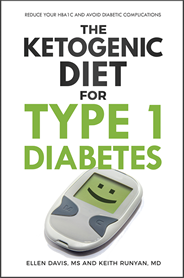Facts About Vitamins and the Ketogenic Diet
The facts about vitamins in relation to a ketogenic diet are debated quite a bit, and there's a pervasive myth that following a ketogenic diet will cause vitamin deficiencies. Let's look at some facts and see if this is true.
Vitamin Myth: You'll become deficient in some vitamin if you don't eat enough vegetables and fruit.
This is one of the more persistent myths surrounding the facts about vitamins in relation to high fat diets. And as with most myths, looking at it closely reveals it isn't true.
It gets repeated the most in relation to a vitamin C deficiency. What most people don't realize, is that you can get enough vitamin C from the meat and green vegetables you'll be eating on the ketogenic diet. The link above to my vitamin C page will give you more information on why.

If you follow a well-formulated ketogenic diet correctly, you'll probably consume more vitamins and minerals than you did on a standard American diet (SAD). This means eating whole foods (i.e., natural fats, meats, leafy green vegetables) and not packaged low-carb junk food.
Here's a quick chart that compares the major vitamins and minerals in plant based foods versus animal based foods. The servings sizes are the same weight, as in 8 ounces of broccoli or chickpeas is being compared to 8 ounces of meat, fish or poultry.
No fair counting cereals or milk because these are artificially fortified. We are comparing real foods here, not processed foods. Okay so take a look... hmm, looks like most of the vitamins and minerals are in the animal based foods. (Comparison made from these tables.)
| Vitamin or Mineral name | Amounts found in one serving of Plant based foods (vegetables, fruits) | Amounts found in serving of Animal based foods (meat, poultry, seafood) | Winner |
| Thiamin (B1) | .1 mg | .8 mg | A |
| Riboflavin (B2) | .20 milligram | 2.9 mg | A |
| Niacin (B3) | 5.8 mg | 16.2 mg | A |
| Pantothenic Acid | 5.2 mg | 15.7 mg | A |
| Vitamin B6 | 1.1 mg | 2.0 mg | A |
| Folate | 358 DFE | 486 DFE | A |
| Vitamin B12 | 0 micrograms (there's no Vitamin B12 in plants) | Lots in animal foods | A |
| Vitamin A | 38,129 IU | 52,000 IU | A |
| Vitamin C | 232 mg | 18 mg | P |
| Vitamin D | 41 IU | 815 IU | A |
| Vitamin E | 7.4 mg | .85 mg | P |
| Vitamin K | 1146 micrograms | 99.7 micrograms | P |
| Calcium | 261 mg | 867 mg | A |
| Phosphorus | 400 mg | 491 mg | A |
| Potassium | 1309 mg | 1600 mg | A |
| Magnesium | 163 mg | 184 mg | A |
| Iron | 8.8 mg | 11 mg | A |
And something else to keep in mind.. grains, vegetables and soybeans (soybeans seemed to be the vegetable-based food that drove the plant winner rows above) are high in many anti-nutrients that bind and remove minerals from the body.
In the rows above in which soybeans won the day, be aware that there is some loss of minerals (calcium and magnesium) because of the phytic acid and lectins in these foods. These seems to be one of the lesser known facts about vitamins and soy, given the huge market for soy products in the US.
This is why anthropological records on the facts about vitamins show that when cereal grains and other plant based diets were introduced and adopted in human societies, rampant osteoporosis and other mineral disorders are prevalent in the skeletal remains of these peoples. It's also why most Americans suffer from a magnesium deficiency as well.
For more information on these skeletal changes, see Loren Cordain's writings on paleolithic diets and how cereal grains cause bone deformations and other human health problems.
More Information
All of my books are available in electronic PDF, and now in paperback on Amazon!
 |
 |
 |
|
Buy paperbook on Buy paperback on Amazon Buy the e-Book via Paypal |
Buy paperback on Buy paperback on Amazon Buy the e-Book via Paypal |
Buy paperback on Buy paperback on Amazon Buy the e-Book via PayPal |